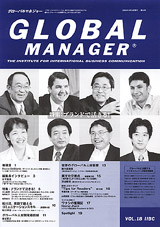Initiative, Flexibility and Communication: A global entrepreneur takes his career into his own hands
Global Manager (日本)
The institute for International Business Communication
Charting a career path
I would have to say that unexpected cicrumstances brought me to where I am today. When I was growing up in India, I was very interested in foreigners and foreign things from a young age. I had always wanted to go abroad, but I didn't have Japan in mind until much later. In India, I was trained as an engineer, and later earned an MBA, which involved specialization in Japan. I went on to work for Accenture in Tokyo, which was an excellent opportunity both in terms of building solid skills and learning in a global environment.
After three years at this company, I began to feel a certain amount of stress, and to question what I really wanted out of my life and career. This was during the late 1990s, when the mobile internet was developing as a new force in business and all sorts of exciting start-ups were taking off. I started to become a bit disillusioned with the thought of putting my destiny in the hands of a large corporation. Did I really want to be a partner or work my whole life in management consulting? I wasn't sure. Certainly it could provide a prestigious career, but I wanted to be involved with implementing new ideas, rather than just making models and writing reports. All these thoughts had been gradually building in my head over time, but the trigger for me was a personal event - the breakup with my girlfriend. I thought I had lost everything, so this meant I was free to try anything. I took the plunge and began my own company.
Running a start-up means that I can't just go to my boss and ask for a new assignment. I have to make every change happen myself. Now that we are a bit more established, the requirements are different than they were when we were just starting out. The company is like a tree with roots these days, which means it can provide shelter - but this also makes it difficult to implement quick change. This stage can be tough for entrepreneurs, who are often driven to their position by a passion for transformation rather than maintenance.
 Finding the right mix
Finding the right mix
In any company, people will have a differing ideas about what is good for the organization, but in international situations, these kinds of ideas can vary even more dramatically. For example, at my former company, I began working on the technology side of the business. However, I wanted to be more involved with strategy. When I expressed my desire to my supervisor, he didn't like the idea and called me "selfish" for wanting to move to a new type of work. This viewpoint surprised me, because I thought that it would benefit the company to have someone familiar with technology working in strategy. Eventually I was able to explain my position and make my case to someone at a higher level of management, and I made the switch.
Another difficulty in global business is knowing when to use standardized approaches and when to adopt specialized measures in a given market. People often say that "Japan is different" and use this as a justification to do things in a certain way, but is it really that much more "different" than other countries? Sometimes this is just an excuse for not making a needed change. At the other extreme, internationl firms with operations in many different nations may take a "template" approach and want things standardized when it really isn't appropriate for a particular location. Finding the right mix is always a challenge.
![]()
Communicating with courage
The most important traits for a good global businessperson are flexibility and communication. Communication can often take place even in broken language if you are willing to try to understsand the other person on an almost intuitive level. To develop these skills, I recommend exposing yourself to other cultures however you can: through travel, books, movies or friends. Stretch yourself by trying something you know you aren't good at. Watch the way you interact with others. Think about how they perceive you, and what this means. And while it is good to admire another country or culture, don't make the mistake of "worshipping" it or thinking that the way other people do things is perfect.
People conducting global business should be courageous about making bold life decisions. Start planning your future before it happens, because these days it is easy to find yourself behind the curve if you wait to long to make your ambitions reality.
Assessing the terrain
As much as I like and respect this country (Japan), I acknowledge that I can't always influence things the way I might want to, I sometimes feel Japanese consumerist attitudes differ from my own value system. I also believe that people here often overpay for services they could otherwise perform themselves, which tends to slow down their business. In general, I strive to create an environment where people can say what they really mean, without tatemae or a blind repsect for authority. I want Japanese people to be happy and to help increase opportunities for themselves (and for me as well) by being open to new things.
Tokyo is a fantastic city to be in because if offers tremendous access to people, things, and information within short distances. I admire the elegance and dedication to quality, service, honesty, and other people I see in Japan every day.
Forward momentum
Japanese competitiveness is not going away, although it may take some time for companies to be truly succesful overseas. I also predict that after 2008 or so, India will begin exhibiting more influence in the world.
In terms of my own life, I will continue to play a role at my company, but at some point I will go on to do something new, because that is the kind of person I am. When the right time comes, I will probably take a long trip and think carefully about the next stage in my career.
Web Site for Global Managers
